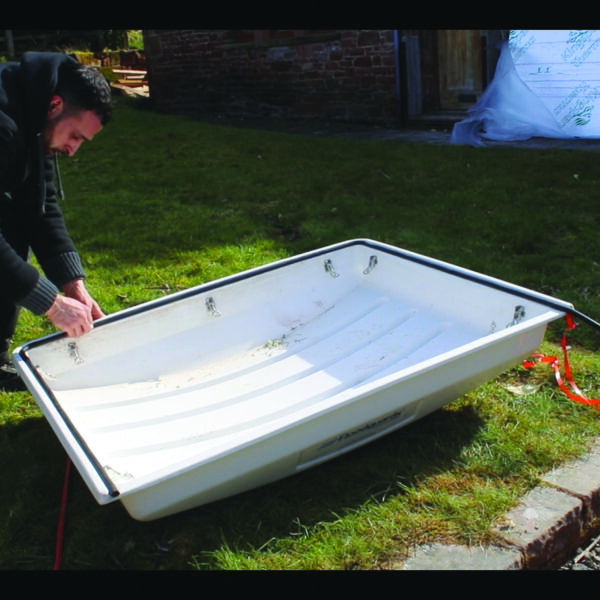Christmas 2021 was a total washout for many people when floods arrived only two days before Christmas day.
Can you begin to imagine just how you would feel if it happened to you? Christmas presents, the tree, and decorations are all wrecked by filthy, stinking flood water and this is on top of sodden belongings and sentimental items. This puts pay to all plans as sadly, the weather doesn’t care if it’s Christmas.
In recent years, we’ve seen floods wipe out many homes and communities over the festive period, and so it is important to make sure a flood plan is in place – not just now but throughout the year.
Of course, in the run up December, we’ve got lots to prepare and think about, and planning for a flood may seem one thing too many. But trust me, if you live at flood risk, it’s time well spent and may reduce an awful lot of heartache.
Listed below are a few things to think about to plan in advance of a flood. Whilst the list is not exhaustive, it’ll certainly help you and when thinking about it, you can add things that are personal to your own circumstances.
Preparing for a flood – what to consider
- Insurance: Make sure you have the correct insurance cover – please check flooding is covered by your insurance provider
- Warnings: Are you signed up for a free Environment Agency Flood Warning? https://www.gov.uk/sign-up-for-flood-warnings
- Utilities: Find out how to turn off your gas, electricity, and water supplies
- Contacts: Keep a list of useful telephone numbers (including your GP details, insurance claim line & policy number)
- Flood Kit: Put together an emergency flood kit, to include the means to keep you warm, food, flasks, torchlights
- Consider Others: Think about the needs of children, babies, the elderly, the disabled who live at home and of course, your pets.
- Photos: Take detailed photos of your property and contents NOW before any flood occurs
- Plan: Make an action plan to use in the event of a flood: I have a guide on my website, which will help you https://marydhonau.com/knowledge-base/how-to-plan-for-emergencies/
- Cars: Always plan to move your car to the higher ground first, as you don’t want a flooded home and a flooded car!
- Make A List: Identify and list urgent actions in priority of value
- Moveable Items: Consider what can or needs to be relocated upstairs, away from potential harm
- Flood Resilience: How are you going to prevent water from entering your home? Research your options.
- Digital: Make sure mobile phone chargers, computer data, and photographs are stored safely
- Consider the Irreplaceable: Most things can be replaced, however, family photographs or your children’s drawings cannot – move them to safety in good time.
During a flood
If a flood does occur, remember that 15 centimeters (six inches) of fast-flowing water can knock you over, 60 centimeters (two feet) of water will float your car, and just an egg cupful of water can wreck an engine.
Flooding can also cause manhole covers to come off, leaving hidden dangers, therefore don’t walk or drive through flood water. There are so many hidden hazards and the water may well be too deep to drive through and it could impact your car’s insurance claim.
Also, don’t walk on sea defenses or riverbanks, and be aware that bridges may be dangerous to walk or drive over if water levels are excessive. Culverts are also dangerous when flooded, and remember to look out for other hazards such as fallen power lines and trees.
Don’t let children play in flood water, be sure to wash your hands thoroughly if you touch floodwater as it will be contaminated, and don’t forget to check on your neighbours – particularly those that you know may be vulnerable or live on their own.
After a flood
Here is some useful advice that I offer to those who have just been flooded;
- Don’t go back into your home until you have been told it’s safe to do so
- Phone your insurance company as soon as possible, many have 24 hours helplines during a flood
- Take photos and a video of the damage; this includes the contents of the fridge and freezer
- Mark a line on the wall as to where the water came up to
- Wear gloves when touching anything that is wet as it may well be contaminated
- Cut a piece of your carpet and save it for the loss adjuster and then try to remove carpets into the garden but don’t throw it away. Carpets hold water into the property and wet heavy items inhibit the drying process
- Once they are outside try to keep windows and doors open to aid ventilation but remember to lock up every time you leave your home as sadly unscrupulous thieves never miss an open door
- For more detailed advice on how to recover from a flood, there is a guide on the front page of www.Marydhonau.com
Plus some basic tips: Beware of tradesmen who say they can start working on your property the next day or offer not to charge VAT – reputable ones are usually busy and will not conduct a project of this scale cash in hand!
Do ask to be put in touch with past clients to see samples of previous repair work, and do your homework: find a tradesperson who has a formal business address, is registered with Companies House, and has a landline number. And never pay in advance; instead, pay in stages and don’t make the final payment until you are completely happy with the work undertaken.
If someone calls and says that they are from the insurance company, check first. If in doubt, contact your insurance company or insurance adjuster yourself to check.
Install property flood resilience measures
Have you thought about protecting your property against the possibility of future flooding?
Products such as self-closing airbricks, flood barriers, flood doors, non-return valves, pumps, and absorbent cushions can significantly reduce the awful impact a flood can bring. Importantly, they may stop water getting in, or lessen the amount that does meaning recovery will be far quicker, less expensive, and you may experience less disruption and repair costs all round.
For more details download a copy of the Homeowners Guide to Flood Resilience on www.marydhonau.com.
Copyright 2022, Mary Long-Dhonau



